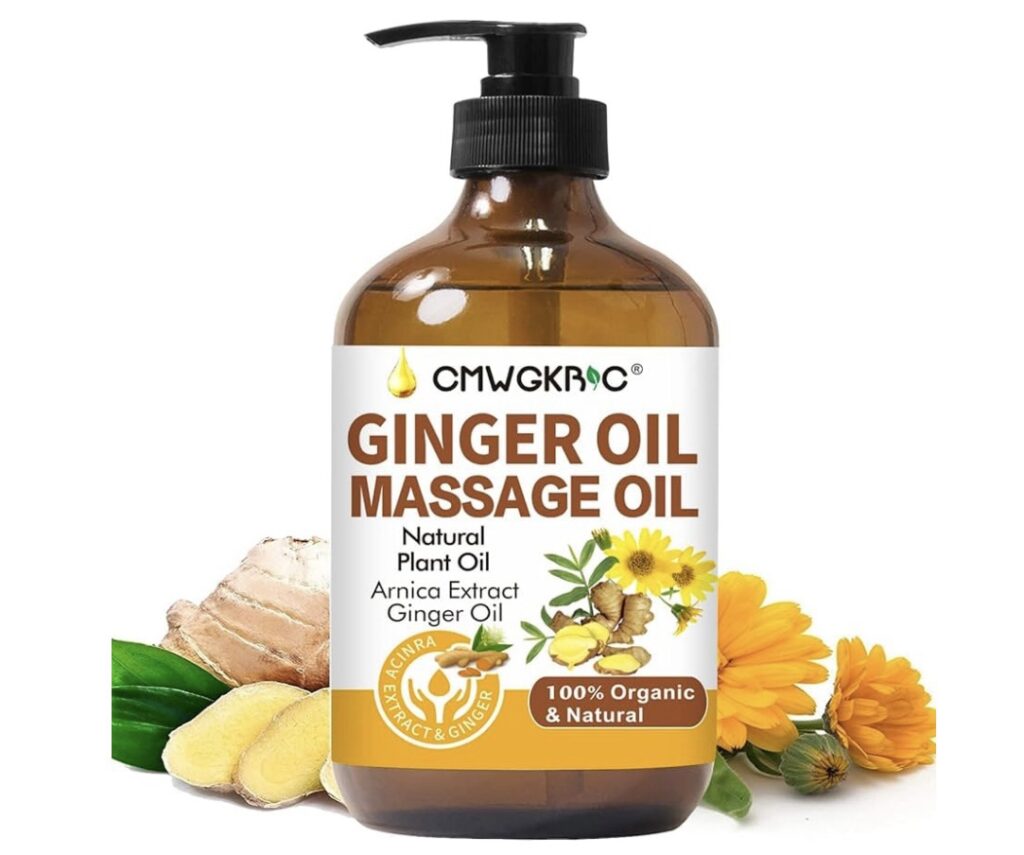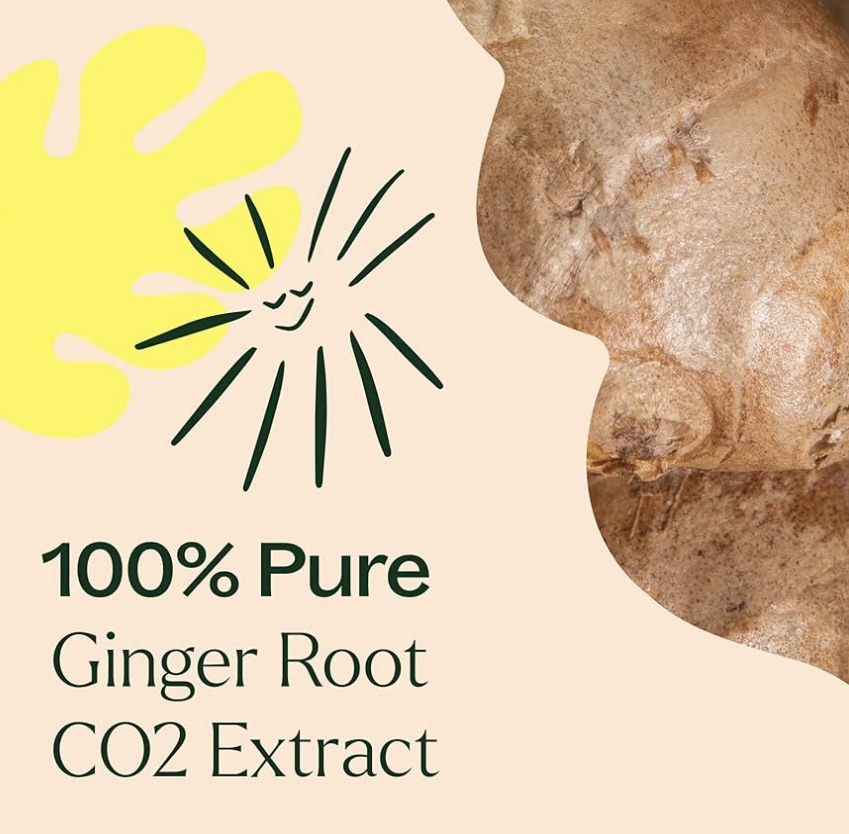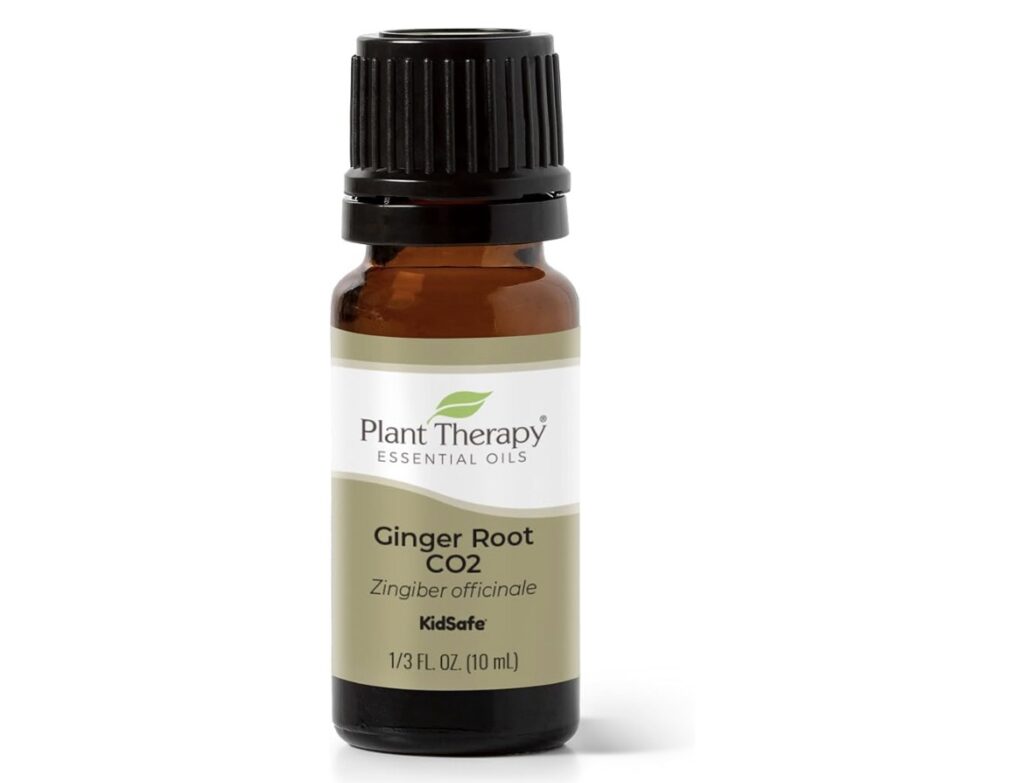What Are the Benefits of Ginger Oil?
Ginger oil, derived from the root of the ginger plant, has been used for centuries in traditional medicine. Today, it’s gaining popularity as a natural remedy for a variety of health concerns. But what exactly are the benefits of ginger oil, and why are so many people turning to it?

Ginger oil is packed with powerful compounds like gingerol, which gives it its characteristic spicy aroma and numerous therapeutic properties. These compounds make ginger oil a potent anti-inflammatory and antioxidant, helping to soothe everything from sore muscles to irritated skin. Beyond physical health, ginger oil is also celebrated for its ability to boost mental clarity and reduce feelings of stress and anxiety.
Whether you’re dealing with chronic pain, looking to improve your skin health, or simply want a natural way to unwind, ginger oil offers a versatile solution that’s worth considering.

How Does Ginger Oil Benefit Your Skin?
Ginger oil is becoming a go-to solution for those seeking natural ways to enhance their skin health. Thanks to its anti-inflammatory and antioxidant properties, ginger oil can significantly improve the skin’s appearance and resilience. It helps reduce redness, irritation, and swelling, making it an excellent choice for those with sensitive or acne-prone skin.
One of the standout benefits of ginger oil for skin is its ability to even out skin tone and reduce the appearance of scars and blemishes. The oil stimulates circulation, which can lead to a brighter, more youthful complexion. Additionally, the antioxidants in ginger oil combat free radicals that cause premature aging, helping to maintain a smooth, healthy look over time.
For those dealing with skin issues or simply looking to improve their overall complexion, adding ginger oil to their skincare routine could be a game-changer. Products like the Plant Therapy Ginger Root CO2 Essential Oil offer a pure, undiluted option that can be easily incorporated into daily skincare rituals, whether used alone or mixed with a carrier oil for direct application.

Why Should You Use Ginger Oil for Hair and Scalp Care?
Ginger oil isn’t just beneficial for your skin—it’s also a powerful ally for your hair and scalp. This natural remedy has been known to improve scalp health, reduce dandruff, and even stimulate hair growth. The secret lies in ginger oil’s anti-inflammatory and antiseptic properties, which help to soothe an irritated scalp and keep it clean from the build-up that can lead to dandruff.
Applying ginger oil to your scalp can also boost blood circulation, which is crucial for hair growth. By improving blood flow to the hair follicles, ginger oil helps nourish the roots, resulting in stronger, healthier hair. Additionally, its warming effect can relieve tension in the scalp, making it a relaxing treatment as well.
For those looking to enhance their hair care routine, using a ginger oil-based product like the Ginger Massage Oil for Lymphatic Drainage is a great option. This oil not only helps maintain a healthy scalp but also provides a soothing massage experience, contributing to overall hair vitality.

Can Ginger Oil Help with Muscle Pain and Inflammation?
Ginger oil is widely recognized for its ability to alleviate muscle pain and reduce inflammation. This makes it an excellent choice for anyone dealing with sore muscles, whether from exercise, chronic conditions, or everyday stress. The anti-inflammatory properties of ginger oil come from its high concentration of gingerol, a bioactive compound that helps to soothe and relax tense muscles.
When applied topically, ginger oil can provide a warming sensation that helps to increase blood flow to the affected area. This not only reduces pain but also speeds up the healing process by delivering more oxygen and nutrients to the tissues. It’s particularly effective when used in massage therapy, where the oil can penetrate deep into the muscles, providing long-lasting relief from aches and stiffness.
For a targeted approach, the Ginger Massage Oil for Lymphatic Drainage is a great product to consider. It combines ginger oil with other beneficial ingredients, such as Arnica extract and Vitamin E, enhancing its ability to relieve sore muscles while nourishing the skin.

Is Ginger Oil Safe to Use?
Ginger oil is generally safe for most people, but like any essential oil, it’s important to use it correctly to avoid potential side effects. One of the key factors in safely using ginger oil is proper dilution. Because essential oils are highly concentrated, applying them directly to the skin without a carrier oil can cause irritation or allergic reactions, especially for those with sensitive skin.
For topical applications, it’s recommended to mix ginger oil with a carrier oil like coconut or jojoba oil before applying it to the skin. A good rule of thumb is to use about 3-5 drops of ginger oil per tablespoon of carrier oil. This dilution not only helps to protect your skin but also makes the oil easier to spread over a larger area.
It’s also important to conduct a patch test before using ginger oil extensively. Apply a small amount of the diluted oil to a patch of skin, such as the inside of your elbow, and wait 24 hours to ensure there’s no adverse reaction. Pregnant or breastfeeding women, and individuals with sensitive skin or certain health conditions, should consult a healthcare professional before using ginger oil.
Choosing high-quality, therapeutic-grade oils is crucial for ensuring safety. The Plant Therapy Ginger Root CO2 Essential Oil is a great option, offering a pure and undiluted product that is ideal for safe and effective use.

Ginger Oil vs. Ginger Root: What’s the Difference?
While both ginger oil and ginger root come from the same plant, they serve different purposes and offer distinct benefits. Ginger root is widely used in cooking and traditional medicine, known for its ability to aid digestion, reduce nausea, and add a spicy kick to dishes. However, ginger oil, extracted from the root, is a more concentrated form that captures the essence of ginger’s active compounds, making it particularly potent for therapeutic use.
The key difference between ginger oil and ginger root lies in their potency and application. Ginger oil contains a higher concentration of gingerol and other beneficial compounds, which makes it more effective for external applications, like reducing inflammation, easing muscle pain, and improving skin health. While you might consume ginger root to help with digestive issues or boost your immune system, ginger oil is more suited for topical use and aromatherapy, providing a targeted and intensified benefit.
For those looking to maximize the benefits of ginger, incorporating both forms into your routine can be highly effective. Use ginger root in your diet to support overall health and well-being, while reserving ginger oil for specific therapeutic applications, such as massage or skin care. For a reliable source of potent ginger oil, consider the Plant Therapy Ginger Root CO2 Essential Oil, which offers the concentrated benefits of ginger in a convenient and versatile form.

Who Should Avoid Using Ginger Oil?
While ginger oil offers numerous health benefits, it’s not suitable for everyone. Certain individuals should exercise caution or avoid using ginger oil altogether to prevent potential adverse effects. For instance, pregnant and breastfeeding women should consult with their healthcare provider before incorporating ginger oil into their routine, as its potent properties may affect pregnancy or lactation.
People with sensitive skin or those prone to allergic reactions should also be careful when using ginger oil. The concentrated nature of essential oils means they can cause skin irritation if not properly diluted. Always perform a patch test before widespread use to ensure your skin doesn’t react negatively.
Additionally, individuals with certain medical conditions, such as gallstones or bleeding disorders, should avoid using ginger oil, as it may exacerbate these issues. Those on blood-thinning medications should also be cautious, as ginger oil can potentially interact with these drugs.
For those who might find ginger oil too strong or are concerned about potential side effects, exploring other natural remedies may be beneficial. For instance, if you’re dealing with post-nasal drip or sinus issues, you might find relief through alternative treatments, which are discussed in this personal journey.

How to Choose the Best Ginger Oil Products
Selecting the right ginger oil product is crucial for maximizing its benefits while ensuring safety. With so many options on the market, it’s important to know what to look for to ensure you’re getting a high-quality product.
First and foremost, always opt for 100% pure, therapeutic-grade ginger oil. This means the oil should be undiluted and free from synthetic additives or fillers, which can diminish its effectiveness and potentially cause irritation. Look for products that specify their sourcing and extraction methods—CO2 extraction, for example, is a method that preserves the most beneficial compounds in the oil, ensuring a potent final product.
Another factor to consider is the oil’s packaging. Essential oils should be stored in dark glass bottles to protect them from light, which can degrade the oil and reduce its potency over time. The bottle should also be tightly sealed to prevent oxidation.
Lastly, reading customer reviews and checking for certifications, like USDA Organic or GC/MS testing (Gas Chromatography/Mass Spectrometry), can provide additional peace of mind that the product is both pure and effective. The Plant Therapy Ginger Root CO2 Essential Oil is an excellent example of a product that meets these high standards, offering a reliable option for those looking to incorporate ginger oil into their wellness routine.
By choosing the best quality ginger oil, you can fully enjoy its wide range of health benefits, from soothing muscle pain to enhancing your skin care routine.

FAQ: Everything You Need to Know About Ginger Oil
1. Can ginger oil be ingested?
While ginger root is commonly consumed for its health benefits, ginger oil should be used with caution when it comes to ingestion. Essential oils are highly concentrated, and ingesting them can cause serious side effects if not done correctly. Only therapeutic-grade ginger oil that is specifically labeled as safe for internal use should be considered, and even then, it should be done under the guidance of a healthcare professional.
2. How can I use ginger oil in aromatherapy?
Ginger oil is a popular choice for aromatherapy due to its warm, invigorating scent. You can add a few drops to a diffuser to help create a soothing environment that may reduce stress and improve mental clarity. Additionally, combining ginger oil with other essential oils like lemon or lavender can enhance its effects, offering a personalized aromatherapy experience.
3. What are the potential side effects of ginger oil?
Although ginger oil is generally safe when used properly, some individuals may experience side effects such as skin irritation, especially if the oil is not adequately diluted. Other possible side effects include digestive discomfort or allergic reactions. Always perform a patch test before applying ginger oil to a larger area and discontinue use if you notice any adverse reactions.
4. Can ginger oil be used to relieve nausea?
Ginger oil is known for its anti-nausea properties, making it a popular natural remedy for motion sickness and morning sickness during pregnancy. However, it’s important to consult with a healthcare provider before using ginger oil for nausea, especially if pregnant, to ensure it’s used safely and effectively.
5. How should ginger oil be stored?
To preserve its potency, ginger oil should be stored in a cool, dark place away from direct sunlight. Keeping it in a tightly sealed, dark glass bottle helps prevent oxidation and maintains its therapeutic properties over time. Proper storage is key to ensuring the oil remains effective for as long as possible.
6. Can I use ginger oil on my pets?
Using ginger oil on pets requires caution. While some essential oils are safe for animals, others can be toxic. Ginger oil can be used on dogs for issues like upset stomach or joint pain, but it must be heavily diluted and used in small amounts. Always consult a veterinarian before using ginger oil or any essential oil on your pets.
7. Is ginger oil effective for respiratory issues?
Ginger oil’s anti-inflammatory and warming properties can help relieve respiratory issues such as congestion or a sore throat. Inhaling ginger oil through steam or using it in a chest rub can open up the airways and provide relief from cold symptoms. However, it should be used cautiously, especially around children or those with sensitive respiratory systems.
These FAQs address additional aspects of ginger oil usage that weren’t covered in the main sections, helping to provide a more comprehensive understanding for readers.

Reviews and Testimonials: Real Experiences with Ginger Oil Products
1. “A Game-Changer for My Skin!”
Sarah W., a 34-year-old from New York, shares how ginger oil transformed her skincare routine: “I’ve struggled with uneven skin tone and redness for years, and nothing seemed to work. After a friend recommended trying ginger oil, I decided to give it a shot. I started using Plant Therapy Ginger Root CO2 Essential Oil mixed with a carrier oil, and within a few weeks, I noticed a significant improvement. My skin looks more even, and the redness has reduced dramatically. I never thought something so simple could make such a difference!”
2. “Relief from Sore Muscles After Workouts”
James L., a fitness enthusiast from California, found ginger oil to be an effective solution for post-workout soreness: “After intense workouts, my muscles would be sore for days, which really interfered with my routine. I started using the Ginger Massage Oil for Lymphatic Drainage after reading about its benefits for muscle pain. The warming effect is immediate, and it helps relieve the tension in my muscles much faster than anything else I’ve tried. Now, it’s a regular part of my recovery process.”
3. “Goodbye Dandruff, Hello Healthy Scalp!”
Emily R., from Texas, struggled with a flaky scalp until she discovered the benefits of ginger oil for hair care: “I’ve tried so many shampoos and treatments for dandruff, but nothing worked long-term. I read about ginger oil’s benefits for the scalp and decided to try it. I’ve been using it regularly, and the results are amazing. My scalp feels healthier, and the flakes are almost completely gone. Plus, my hair looks shinier and stronger. The Ginger Massage Oil has been a lifesaver!”
4. “Natural Relief for Joint Pain”
Robert M., a retiree from Florida, shares how ginger oil helped manage his joint pain: “I’ve had arthritis for years, and the pain in my joints can be unbearable, especially in the winter. A friend recommended trying ginger oil, and I decided to give the Plant Therapy Ginger Root CO2 Essential Oil a try. I mix it with a little coconut oil and rub it into my knees and elbows. It doesn’t completely take the pain away, but it makes a noticeable difference, and I prefer it over taking pain meds all the time.”
5. “Stress Relief in a Bottle”
Lisa T., a busy mom from Illinois, found ginger oil to be a great stress reliever: “With two kids and a full-time job, my stress levels are through the roof. I started using ginger oil in my diffuser after reading about its calming effects, and it’s been a game-changer. The scent is soothing, and it really helps me unwind at the end of the day. I also use the Ginger Massage Oil during my nightly routine, and it helps me relax and sleep better. I couldn’t recommend it more!”
These testimonials showcase the positive experiences people have had with ginger oil, emphasizing its versatility and effectiveness across various uses.

As an Amazon Associate we earn from qualifying purchases through some links in our articles.




